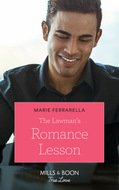Buch lesen: "Her Mistletoe Cowboy"
Praise for Marie Ferrarella
“A joy to read.”
—RT Book Reviews on Christmas Cowboy Duet
“Ferrarella’s romance will charm with all the benefits and pitfalls of a sweet small-town setting.”
—RT Book Reviews on Lassoed by Fortune
“Heartwarming. That’s the way I have described every book by Marie Ferrarella that I have read. In the Family Way engenders in me the same warm, fuzzy feeling that I have come to expect from her books.” —The Romance Reader
“Ms. Ferrarella warms our hearts with her charming characters and delicious interplay.”
—RT Book Reviews on A Husband Waiting to Happen
“Ms. Ferrarella creates fiery, strong-willed characters, an intense conflict and an absorbing premise no reader could possibly resist.”
—RT Book Reviews on A Match for Morgan
Her Mistletoe
Cowboy
Marie Ferrarella

MARIE FERRARELLA, a USA TODAY bestselling and RITA® Award-winning author has written more than two hundred and fifty books for Mills & Boon, some under the name Marie Nicole. Her romances are beloved by fans worldwide. Visit her website, www.marieferrarella.com.
MILLS & BOON
Before you start reading, why not sign up?
Thank you for downloading this Mills & Boon book. If you want to hear about exclusive discounts, special offers and competitions, sign up to our email newsletter today!
Or simply visit
Mills & Boon emails are completely free to receive and you can unsubscribe at any time via the link in any email we send you.
To Father Anthony
of
St. Joseph’s Indian School
Thank you for all you’ve done
and
keep up the good work!
Contents
Cover
Praise for Marie Ferrarella
Title Page
About the Author
Dedication
Prologue
Chapter One
Chapter Two
Chapter Three
Chapter Four
Chapter Five
Chapter Six
Chapter Seven
Chapter Eight
Chapter Nine
Chapter Ten
Chapter Eleven
Chapter Twelve
Chapter Thirteen
Chapter Fourteen
Chapter Fifteen
Chapter Sixteen
Chapter Seventeen
Epilogue
Extract
Copyright
Prologue
“No.”
Stunned, Garrett White Eagle stared at his older brother, Jackson. He’d just checked his email and when he read the notification from the editor in chief of a well-known magazine, asking to do an in-depth article on the work he and his brother were doing at the Healing Ranch, he thought that Jackson would be as excited about it as he was.
Obviously not.
This was going to take some work on his part, Garrett decided.
“No?” he repeated incredulously. “What do you mean, no?”
Jackson rose from behind the scarred, second-hand desk he’d rescued from being turned into kindling half a dozen years ago. He had a full day ahead of him at the ranch and he’d already wasted enough time with the stack of unpaid bills that seemed to be breeding on his desk. Apparently, moving them from one pile to another didn’t diminish their number or get them paid off any sooner.
He couldn’t think about them right now. The boys were waiting for him at the corral. The bunkhouse was almost filled to capacity and every teen currently staying at the ranch required individual care. He’d sworn when he took all this on that nothing short of that would suffice and he had meant it. But it did get hard to live up to at times.
“No,” Jackson repeated. “It’s a simple enough word to grasp.” The corners of his mouth curved just the slightest bit as he glanced toward his younger brother. “Even you, with your limited education, should be able to figure out its meaning.”
“Look, I get it. You’re not into social media. But I’m not asking you to get on Twitter, or Facebook, or any of the other modern innovations you keep insisting on staying clear of. I’m not even asking you to use smoke signals, like our ancestors. But to turn your back on a magazine interview is positively criminal,” Garrett accused. “Western Times is a big-time magazine,” he emphasized, as if the increased volume would somehow get his brother to agree. This was an opportunity and he wasn’t about to give up until he made Jackson see the light. He had his work cut out for him, seeing as Jackson could bring new meaning to the word stubborn when he wanted to.
Jackson turned around for a split second, looking his brother in the eye and enunciating every word slowly. “I can’t make time for it.”
“Do you have time to make money?” Garrett asked. “How about that? Do you have time to do that?”
Jackson stifled an impatient sigh. “What are you talking about? They’re not paying us for the interview.”
“No, but doing the interview could really pay off in the long run.” Garrett picked up his pace to keep up with Jackson.
Just like when we were younger, he couldn’t help remembering. Back then, he’d worshipped Jackson, who was five years his senior. Technically, Jackson was his half brother. They shared a father who wasn’t interested in either of them. Ben White Eagle walked out on them just the way Jackson’s mother had walked out on him several years before that. It was his own mother who was left with the task of raising both of them.
Sylvia White Eagle was a warm, loving woman who more than had her hands filled with a very hostile, rebellious Jackson. Jackson was always rushing off to be with his friends, friends who were interested in grabbing what life hadn’t given them. Friends who kept getting him into more and more trouble.
Desperate, Sylvia had turned to Sam, her ex-husband’s brother, and Sam had taken Jackson in hand, putting him to work on his ranch. It was there that Jackson got his life back.
As for Garrett, he had joined Jackson and his uncle when his mother died. They worked the ranch together and when Sam passed away, he had left the ranch to both of them.
It was Jackson’s idea to start up the Healing Ranch, creating it in Sam’s honor. There Jackson and Garrett put Sam’s methods to work, using horses as a way to get through to misguided, wayward boys and make them come around rather than turning into hardened criminals.
Since its slow start, the ranch had been growing increasingly successful. Despite that, it wasn’t making any money, but that was because Jackson, ever mindful of the dire circumstances some people found themselves in, only charged what he felt the parents or guardians who came to him as their last hope could afford to pay. But their bills to run the ranch just kept on growing.
From what Jackson had let slip recently, they couldn’t be ignored too much longer.
And now, Garrett thought, it seemed that Fortune had decided to smile on the Healing Ranch—except that Jackson refused to see it that way.
Garrett was determined not to have him pass up on what just might be their one chance to make things work.
He blew out a frustrated breath. Jackson apparently had stopped paying any attention to the conversation he thought he was having with his brother.
“The Saunders kid is finally ready to get in the saddle,” Jackson was saying as he walked toward the front door.
Garrett hurried after him. Spotting Debi in the living room, Garrett immediately enlisted his sister-in-law as an ally. “Debi, talk some sense into this lunkhead you married,” he pleaded.
The blonde, green-eyed nurse willingly obliged. “Lunkhead, listen to your brother.” Debi smiled at Garrett as she lifted her shoulders in a helpless shrug. “I tried. By the way, what’s he supposed to be listening to?”
“The voice of reason,” Garrett answered, doing his best to keep his temper.
“Ha!” was Jackson’s response. He looked at his wife of three months, appealing for her to back him up. “He wants some woman to come out and follow us around, asking a bunch of questions, snooping and getting in the way.”
“Auditioning for a wife, Garrett?” Debi asked her brother-in-law, amused.
“No point. Jackson’s already snatched away the love of my life,” Garrett replied with a good-natured wink. And then he grew serious. “I’m just trying to find a way to keep the wolf from the door.”
As down to earth as her husband, Debi took an active interest in the monetary issues that went into running the school. It was the school that had initially brought her here, looking for a way to get through to her younger brother before he destroyed himself. If possible, she was even more dedicated to keeping the ranch operating than either of the brothers.
“Keep talking,” she urged Garrett.
Jackson groaned. “Don’t encourage him.”
But Garrett was quick to get his sister-in-law to join forces with him. He felt confident that Jackson wouldn’t say no to her. “Western Times Magazine wants to send a writer to come out and do a story about the ranch.”
Surprised, Debi turned toward her husband. “That’s wonderful!”
“What’s wonderful about it?” Jackson asked. “I’ve got a ranch to run, I don’t have time to answer a bunch of questions.”
“Then don’t,” Debi told him simply. Before Jackson could say something about being vindicated or Garrett could complain that he thought that she would have been on his side, she came through with the natural solution. “Have Garrett do it. He’s a lot more outgoing than you are, anyway.”
Jackson pretended to scowl. “Thanks.”
Debi hooked her arm through his, looking up into his eyes. Her own were sparkling with humor. “But you have all these other fine qualities.”
“I guess I do at that.” Jackson laughed, allowing himself one quick kiss before he looked at his brother. “Okay, call them and tell ’em she can come.”
This time it was Garrett’s turn to kiss Debi, planting one on her cheek. “Bless the day you came here, Debi! I’ll call them right now before Smiley here changes his mind!”
And with that Garrett raced up the stairs to his room and his computer.
Chapter One
“Really? You’re serious? Two weeks before Christmas and you’re sending me to Siberia?” Kimberly Lee cried, appalled and stunned.
“Forever, Texas,” Stan Saunders corrected her tranquilly.
The editor in chief of Western Times Magazine, as well as several other magazines that came under the Union-Post Publishing masthead, was known for his calm, almost monotone demeanor. He had a voice to match. It never rose above a certain level, no matter what was being said or how upset the person on the receiving end might be.
As was the case with Kim, who had asked to see the editor in chief in order to score an assignment for one of the magazines he oversaw. At the time she definitely hadn’t set her sights on an article for Western Times Magazine, in her opinion the least sophisticated of the magazines in the array.
She’d grown more and more stunned as Stan described the article he wanted and the place that he was sending her to.
“Same thing,” Kim complained. Grasping the armrests, she moved to the edge of the chair she’d taken in his glass-enclosed office. “Look, I know I’m just a lowly freelance writer—”
“Yes, you are,” Stan agreed all too readily, indicating that she had made her point for him.
Refusing to be deterred, Kim forged on. “But you’ve got to have some other story than this you want me to write.”
She stopped just short of pleading, aware that Stan had no use for that sort of tactic. She’d been writing for Stan for a little over a year now, coming in twice a month to see what sort of articles were up for grabs. Each magazine had its own small in-house stable of writers. The slack was taken up by freelance writers who were eager, like her, to prove their worth while earning extra pocket money. Most stitched together a living—if that was their goal rather than just some additional income—by making the rounds to various publishers, as well as haunting blog-oriented websites.
“No, I don’t,” Stan told her. “It’s either this, or come back in a couple of weeks.”
She sighed. “I don’t have a couple of weeks. My rent check is due now—not to mention that in a couple of weeks, it’ll be Christmas and last year, there was nothing to be had,” she reminded him.
There was just a hint of concern on the crusty, bald man’s face as he asked, “Can’t hit up Mom and Dad for the money?”
Kim knew he was aware of her backstory. At least, as much as she’d told to him. Whether or not he remembered it, given how many writers he dealt with, was another matter.
Giving him the benefit of the doubt, she pretended he remembered. “And have them look at me with pity in their eyes?” She shook her head emphatically. “I’d rather die first.”
Stan inclined his head, conceding the point. “Fair enough. How about those two successful sisters of yours? Didn’t you tell me they were surgeons or something like that? They must have money they can lend their little sister.”
Monica and Maureen would have more than readily given her the money she needed, but they were like her parents, convinced that she should have done something better with her life and if nothing else, should now be running, not walking, to the nearest university to enroll and get herself on track for a real career, not one that was grounded in make-believe.
That was how her whole family viewed her career path—chasing after make-believe.
More than anything, ever since she could remember, she had dreamed of being a writer, an important writer who would someday write that one book people would always remember. Not for a week, or a month, but one that would live on through the decades, a book that would make a real difference to people.
In the meantime, she had resigned herself to the fact that she had bills to pay, so any work she could get as a freelance writer had to make do for now.
Almost any work, she silently amended. There had to be something else, some other article that didn’t involve sagebrush and horses and brawny, uneducated cowboys.
“See the above answer,” Kim quipped regarding asking her sisters for help.
Stan believed in being helpful, but only up to a point. That point did not include fabricating work for his writers, even if he had come to secretly like their spirit, and Kim was nothing if not the embodiment of that old-fashioned term, spunk.
“Well, unless you have a rich sugar daddy tucked away somewhere, or are planning on selling your soul to the devil by midnight to keep that old wolf from the door, I’d say you’d better get busy, pack up your go-bag and book a flight to Laredo.”
“Laredo?” she repeated, confused. “I thought you said that I was going to some place in Texas called Farewell.”
“Forever,” Stan corrected patiently. “And your hearing’s good. You are.”
She didn’t get it. “If I’m going to Forever, why am I flying to Laredo?”
“Simple,” he told her. “Forever doesn’t have an airport. You’re going to have to rent a car and drive the rest of the way. Keep your receipts,” he advised. “There’s a little extra in petty cash. I’ll see what I can do about reimbursing you for some of that.”
This was beginning to sound better and better, she thought, exasperated.
“Do they have indoor plumbing?” she asked. She was only half kidding.
Stan never cracked a smile. “So I hear.” He raised his deep-set eyes to hers. “I also hear they’ve built a hotel.”
Why was he telling her that? “Is there something unusual about it?”
Thin, bony shoulders rose and fell beneath a light gray shirt that appeared to have been slept in at least a couple of times. “Not that I know.”
Okay, she still wasn’t enlightened about the point of this conversation.
“Then why are you...?” And then it hit her. “Wait, you don’t mean that they didn’t have hotels there before this one.”
This time, he did allow a small smile to edge out. “That’s exactly what I mean.”
“What kind of a hellhole is this place?” she cried.
“The kind of hellhole where kids whose parents think there’s no reaching them get turned around and become the decent people they were always meant to be.” The editor paused for a long moment, as if silently debating something with himself. Finally, in the same low-key voice he always used, he said, “My nephew, Jordy, is there.”
Kim’s dark brown eyes widened. He’d told her it was a sort of reformatory school with horses. That meant his nephew was one of those troubled delinquents he’d mentioned.
“I’m so sorry.” She assumed that would be the response Stan was expecting.
But the editor surprised her by saying, “Don’t be. That place is the best thing that could have happened to him.” The most genuine smile she’d ever seen was curving Stan’s lips as he went on to tell her, “My sister Paula said Jordy actually called home last week. Told me he sounded more like himself than he had in the last three years. She was crying those ridiculous happy tears at the time, the ones that you women use to confuse men.
“A place that can do that for a kid, for a family,” he went on to say, “well, other people deserve to know about it.” He grew very serious now as he looked at her. “You want to do an important story? This is an important story,” he told her with emphasis. “Go do it and do it right.” It was more of an order than an instruction. “You do a good enough job, then we’ll talk about where your career could go with the magazines I edit when you get back.”
She warned herself not to get excited. There was always a downside to everything. She just hadn’t heard all of it yet. “Is that anything like dangling a carrot in front of me?”
“Carrot?” Stan echoed. He permitted himself a dismissive snort. “More like the whole damn bushel. Open your eyes, Lee, and take in the whole picture. I’m giving you a chance here.”
Kim tightened her hands on the armrests and pushed herself up to her feet. She knew Stan. She wasn’t going to get a better offer no matter how much she battered him. It was up to her to turn what really sounded like a fluff piece to her into something golden. “Then I guess I’m off,” she told him.
The phone on his desk was ringing. Stan covered the receiver with his wide, spidery hand, waiting to pick it up.
“Yes, you are,” he acknowledged just before he picked up the receiver.
* * *
THIS WASN’T JUST another state, Kim thought as she drove the compact tan Toyota she’d rented at the airport, it was another world. Some parallel universe that perversely coexisted beside the modern, sophisticated one to which she had not only been born, but where she thrived and definitely preferred being.
San Francisco had been home to her for all of her twenty-eight years, and while some of the people she knew claimed to actively love “getting away from it all” by doing things like going camping and hiking in the mountains, the thought of being somewhere where sidewalks were only a theory, not a genuine fact of life, seemed somehow barbaric to her.
Even in her teens, she had never had a desire to be “one with the earth” or to even mildly pretend to be “roughing it.” To her, roughing it meant doing without her cell phone or her laptop for half a day and even that made her feel more than vaguely uncomfortable, as if she had lost her hold on civilization, her connection to the outside world.
Which was what she was beginning to feel as she traveled down what she supposed amounted to a two-lane road to this town that seemed to mean so much to Saunders. A town that some of the maps didn’t even have listed.
Kim could feel a sense of desperation beginning to build up within her.
“Brigadoon, Stan is sending me to Brigadoon,” she muttered under her breath, thinking of the village in the musical revival her mother had all but dragged her to when she was only about nine.
Looking back, she recalled that her mother was always trying to infuse a love of music and culture into her three daughters. Monica and Maureen had lapped it up. She remembered feeling that a play about a town that popped up every hundred years for a day’s time before disappearing again was dumb, not to mention scary. Her mother had called her hopeless; her father had come to her defense, calling her a free thinker. But eventually, even he had given up on her.
Both her parents, she knew, wanted her to “be somebody.” Her sisters had both followed their example, or at least their father’s example. David Lee was a well-respected neurosurgeon at the prestigious UCSF Medical Center and each of her sisters had their own surgical specialties and enjoyed surgery privileges at the same hospital, making her father exceedingly proud.
Her mother was a law professor at the University of San Francisco. Her classes were always in demand. Which made her, with her BA in Liberal Arts—emphasis on English—the official black sheep of the family.
“You’d think, with an Asian-American father and a mother whose grandparents hailed from Ireland and Scotland, and came here eager to make something of themselves in their adopted county, you’d have some real drive, some kind of ambition to become someone,” her mother had lamented when she had informed her parents that she was not applying to either medical school or law school.
Well, she had drive. Only her drive just happened to be in another direction than her parents and sisters had taken.
A drive that was stalling, Kim thought in disgust, with this detour to write a story about a town that was barely a visible dot on the map.
She would have been tempted to say that Stan had made the whole thing up, playing some really bizarre belated April Fool’s prank on her two weeks before Christmas—except that she had actually managed to find the damn hole-in-the-wall on her GPS when she’d gotten into the car she’d rented at the airport.
The airport at Laredo had been all right, she supposed. Nothing like what she was used to in San Francisco, but compared to what she was looking at now on her way to Forever, the airport seemed like an absolute Shangri-la.
How did people survive in places like this? And why would they even want to if they had to live out their whole lives here? Kim couldn’t help wondering. There were miles and miles of miles and miles, nothing else in either direction.
All she knew was that if she’d been born in a place like this, she would have saved every dime she could and the moment she graduated high school, she would have been gone—maybe even before then if the opportunity presented itself—but definitely the second she graduated.
There was nothing out here except for desolation, with an occasional ranch thrown in between, but she hadn’t even seen one of those for an hour now.
People who lived in this part of the country probably looked like dried-up, wrinkled prunes by the time they were thirty-five, she estimated, glancing up toward the sky through her windshield.
Not wanting to usher in the dust, she had her windows rolled up and soon discovered that it was warm in her car. The weather down here was a lot warmer than she was accustomed to this time of year. She shouldn’t have wasted her time packing heavy sweaters and jackets, she thought.
You shouldn’t have wasted your time coming here at all, a nagging voice in her head that sounded suspiciously like her sister, Monica, whispered to her. Mom and Dad would have been more than happy to lend you the money—or better yet, have you move back into the house. It’s way too big for just the two of them.
Great, now she was hearing voices. More specifically, Monica’s voice.
That was all she needed, to get heatstroke out here, Kim thought in exasperation. Next, she would start hallucinating.
Damn it, she should have held out. There had to be some other story on Stan’s docket, something she could have worked on that was a lot closer to home than this. Union-Post Publishing owned a theater magazine, didn’t it? Stan could have easily sent her to do some puff piece on the new theater season that was coming next fall. Anything other than this Sagebrush Cowboys Save Troubled Teens thing he wanted her to write.
With every passing minute, she grew more irritable.
She should have stood her ground and dug in. Now it was too late and she was stuck out here. Stuck going to some stupid town called Farewell, or Forever, or Four Miles From Nowhere—
Kim’s eyes widened as she stared at the small rectangular screen on the dashboard that had, until a moment ago, been her GPS monitoring unit.
Except now it wasn’t.
It wasn’t anything.
The screen had gone blank. Desperate, Kim hit the blank screen with the heel of her hand, trying to make it come around. It remained blank.
That was what she got for renting a compact car, she upbraided herself.
Trying to figure out what to do, she pulled the car over to the side of the road—although if she just kept on going, what was the difference? she asked herself. It wasn’t as if she’d hit anything. There was nothing for her to hit in either direction, not even a rabbit, or snail, or whatever animals they had out here in the forgotten desert.
With the car idling, Kim shifted in her seat and pulled her purse back onto the passenger seat. Her purse had lunged onto the floor when she’d pulled over a bit too suddenly, spilling, she now saw, its entire contents onto the floor of the car. Everything was in a jumbled heap.
Swallowing a curse, she pulled it all together and deposited it back into her purse—all except for her cell phone. That she took and opened. She swiped past a couple of screens until she found the GPS app that had come preinstalled on her phone.
Despite the fact that she’d lived her entire life in San Francisco, she still managed to get lost on a fairly regular basis and she had come to rely rather heavily on her phone’s GPS feature.
A feature which wasn’t pulling up, Kim noticed angrily as she stabbed over and over again at the small square image on her phone. When the image finally did enlarge, the words below it irritatingly informed her that it couldn’t find a data connection and thus, the very sophisticated feature on her phone containing all the latest bells and whistles wasn’t about to ring any of its bells or blow any of its whistles, at least not now. Not until its lost signal was suddenly restored.
“Damn it, I really am in hell,” Kim declared, looking around.
There were absolutely no signs posted anywhere to tell her if she was going in the right direction or even if she was going around in circles. For all she knew, she wasn’t even in Texas anymore.
The dirt road was too dry and hard to have registered her tire tracks, so she had no idea if she had traveled this way before.
“I could be going around in circles until I die from dehydration out here, and nobody’d know the difference—not even me,” she lamented.
Why had she ever said yes to this horrible assignment?
For two cents, she’d turn around and go back—except that she had no idea if turning around actually meant that she was going back. Maybe if she turned around, she would eventually wind up driving into this town she didn’t want to go to?
Damn it, she was confusing herself.
Feeling panicky, Kim looked around the interior of the pristine vehicle to see if there was anything packed in one of the side pockets that could help her.
After foraging around, she discovered an old folded map tucked into the side of the rear passenger door, but when she opened it, she found that the map did her no good. A product of the digital age, she had absolutely no idea how to actually read a map.
She was going to die out here, Kim thought, tossing the map aside. She was going to die out here and most likely, no one would ever even find her body.
She still stubbornly didn’t regret not going to her parents for money. If she had to die, she would die rebellious and proud.
What did it feel like, she wondered, baking to death inside a low-end economy car? Maybe she should have rented something more high-end, like a Mercedes or a Jaguar. If it was going to wind up being her casket, then maybe—
A flash of something on the hill in the distance caught her eye.
Kim sat up, trying to focus as a glimmer of hope surfaced.
Was that a hallucination, or—?
Die kostenlose Leseprobe ist beendet.








